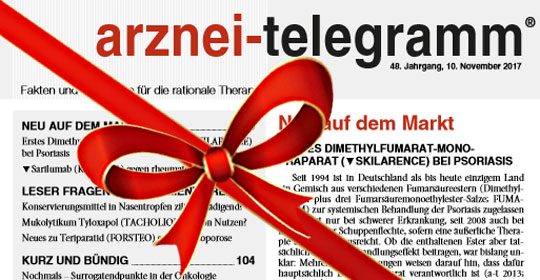Translation of a-t 2022; 53: 23
IN BRIEF
Studies are still published selectively
For decades, pharmaceutical companies did not have to worry that it would be noticed that studies with negative results were either not published or only published in a distorted manner. This has changed in recent times as the best evidence is systematically sought within the evidence-based medicine framework. The extent of the bias was highlighted, for example, with an assessment (1) of all 74 studies on 12 antidepressants submitted to the US Food and Drug Administration (FDA) between 1984 and 2004. While only half of these studies (38 out of 74; 51%) generated positive results for the investigational medicinal products, 94% (48 out of 51) of the papers actually published subsequently showed a positive result - on the one hand because the number of negative studies is smaller due to non-publication, and on the other hand because studies that were originally negative were tweaked to positive before publication (a-t 2008; 39: 22 and 2010; 41: 1-3) (1). A currently published follow-up study is now using the same methodology to assess if and how the studies on four newer antidepressants submitted to the FDA between 2008 and 2013 are reflected in subsequently published papers (2). As in the initial cohort, only half of the 30 studies submitted to the authorities during this period were positive for the investigational medicinal products. This time, 22 (73%) of the 30 papers can be identified as individual publications (8% more than in the previous analysis). Since 6 negative studies were not published and 2 were only published in a non-transparent manner, a false positive picture continues to emerge for antidepressants on assessing the data publicly available: Now 68% (15 out of 22) of the individual studies found are positive. Overall, the result constitutes little progress compared to the previous cohort (2). The gradual improvement in publication transparency may have been helped by the decision taken by the International Committee of Medical Journal Editors (ICMJE) to publish studies from 2005 onwards only if they are recorded in a public study registry before the first patient is enrolled in the study (3). Antidepressants are probably the indication group whose publication status has been reviewed most extensively. The extent to which current results can be transferred to other indications remains open. In principle, all clinical trials must be publicly accessible in a transparent manner, regardless of the outcome (see a-t 2019; 50: 100-3),-Red.
| 1 | TURNER, E.H. et al.: N. Engl. J. Med. 2008; 358: 252-60 |
| 2 | TURNER, E.H. et al.: PLoS Med. 2022; 19: e1003886 (21 pages) |
| 3 | ICMJE: Recommendations, update Dec. 2021; https://a-turl.de/ww9n |
© arznei-telegramm (Berlin/Germany), March 2022, protected by copyright laws.
Autor: Redaktion arznei-telegramm - Wer wir sind und wie wir arbeiten
Diese Publikation ist urheberrechtlich geschützt. Vervielfältigung sowie Einspeicherung und Verarbeitung in elektronischen Systemen ist nur mit Genehmigung des arznei-telegramm® gestattet.
